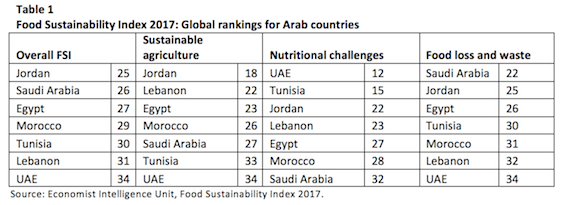The 2017 report of the Food Sustainability Index (FSI) developed by The Economist Intelligence Unit and Fondazione Barilla highlighted the food challenges faced by Arab countries. FSI includes Egypt, Jordan, Lebanon, Morocco, Saudi Arabia, Tunisia, and the UAE. In these countries, food loss and waste are much higher than the global average. At the same time, malnutrition and micronutrient deficiencies remain significant issues in some areas.
This region is undergoing a “nutritional transition,” even in low-income countries. The diet is gradually shifting towards a Western style, with energy-dense foods, animal proteins, and fats, but lacking in fiber. This change, along with a sedentary lifestyle, has led to an increase in health problems such as obesity, type 2 diabetes, and cardiovascular diseases.

Pressure from population growth, urbanization, and climate change
Rapid population growth and urbanization in Arab countries mean that food demand will increase significantly. However, increasing local food production is challenging, especially as climate change exacerbates water scarcity. In many areas, groundwater extraction exceeds the recharge capacity, leading to salt accumulation and desertification. Additionally, unsustainable farming practices, such as intensive tillage and chemical fertilizer abuse, degrade soil fertility.
Climate change also poses the risk of rising sea levels, especially in Mediterranean countries like Egypt. The Nile Delta, an important farming area, is facing the threat of flooding due to the rapid erosion of protective sand barriers.
These challenges increase the risk of “food insecurity,” forcing the region to import more. This is already a region with high grain imports, and reliance on global supply makes Arab economies susceptible to fluctuations in international food prices.
According to FSI, the rankings of the seven Arab countries are low, with Jordan being the highest (ranked 25th) and the UAE the lowest (ranked 34th).

Sustainable agriculture in Arab countries
Many Arab countries face significant water challenges in agriculture. Gulf countries, such as the UAE, rely on depleting aquifers and costly desalination plants due to low rainfall. The UAE also struggles with high greenhouse gas emissions, negatively impacting its agricultural sustainability score.
In contrast, Jordan – the highest-ranked country in the region for sustainable agriculture – does not face many water issues. However, soil fertility decline due to intensive farming remains an increasingly serious threat. Supporting farmers to transition to more sustainable production methods could help mitigate this issue. Research projects, such as ACLIMAS, have shown that using new crop varieties and changing farming practices can help reduce the negative impacts of climate change.
Nutrition challenges
Saudi Arabia has the poorest nutrition record in the region, while the UAE ranks highest. The UAE scores well due to low rates of stunted growth, underweight children, and micronutrient deficiencies. However, both the UAE and Saudi Arabia are facing increasing obesity issues. Approximately 68% of adults in the UAE and 70% in Saudi Arabia are overweight. Measures such as nutrition education and implementing taxes on sugary drinks could help mitigate this situation.
In other countries, malnutrition remains a serious threat. Egypt has a high rate of stunted growth, underweight, and wasted children. Micronutrient deficiencies are also prevalent in many areas. For example, in Morocco, 63% of the population lacks iodine and 40% lack vitamin A. These issues can be completely addressed through effective vitamin supplementation programs.
Food loss and waste in the Arab world
Food loss and waste are significant issues in Arab countries, with low rankings in FSI. Saudi Arabia scores highest due to investments in infrastructure and good transportation networks, helping to reduce food loss before reaching the market. However, the country still wastes about 250 kg of food per person per year at the consumption stage.

The UAE has the worst performance, with an average food waste per capita of up to 986 kg/year – the highest among the 34 countries studied.
Some other countries are working to improve. Egypt has implemented a smart card system that limits the amount of subsidized bread each day for each family. As a result, the amount of wasted bread has significantly decreased. Jordan is also considering applying this model to reduce waste in subsidized food.
Wide open for Vietnamese goods in the Middle East

